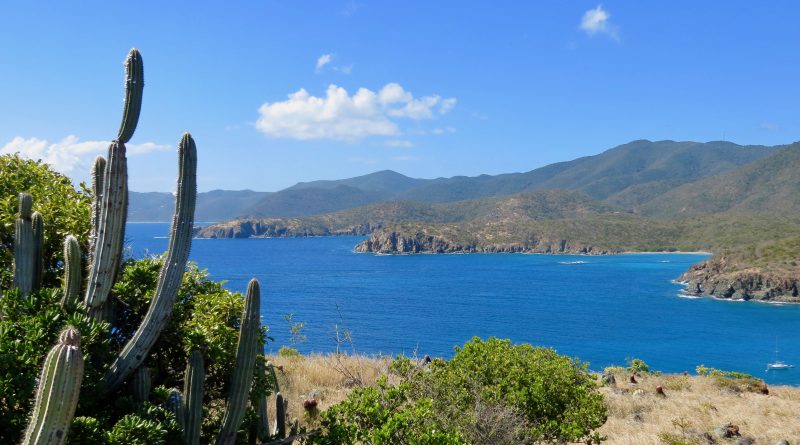Opinion: A Surprise

A scene from the Virgin Islands. Photo: Russ Vernon-Jones

I got a surprise the other day. I came across a reference to the Yale Climate Opinion Maps produced by the Yale Program on Climate Change Communication. I remembered that I had been intrigued by these maps once before, so I decided to browse a bit and see what I could find. These maps show how Americans’ climate change beliefs, risk perceptions, and policy support vary from place to place.
Polling was done all over the United States, asking questions of a large number of people. Then the data were analyzed using sophisticated statistical techniques to generate reliable estimates of pubic opinion related to climate change in the nation and in every state, metro area, congressional district, and county. You can pick from over twenty questions and see the estimates for the whole country or for a single county. Compelling color coded maps present the data visually as well as numerically.
Should Schools Teach About Global Warming?
Perhaps because I was a public elementary school educator for many years, my eye was caught by a question about whether schools should teach children about global warming. It turns out that the percentage of adults in the United States who “believe schools should teach about the causes, consequences, and potential solutions to global warming” is 77%! Only 23% disagree. This is a huge percentage that support what I supposed might be quite controversial. What I found even more surprising is that when you set the map to show results at the county level, in every county in the country a majority of adults agree!
It’s very significant that the level of support for teaching about global warming is higher than most people think it is. People’s perceptions about public opinion affect their behavior. Research shows that when people think the level of support for addressing climate change is low, they are less likely to bring up the topic, to share their views, or to advocate for action. When people think lots of the public disagrees with them, they are more likely to stay silent. This silence slows down climate action and hinders developing the even larger national consensus that we need to take bold steps to prevent further climate catastrophe.
Let People Know
It’s important to tell everyone you know about this high level of support. When people know there’s support, they are more likely to talk about it and support action. This is also a positive way to start a conversation about climate – much easier than hitting people with the latest gloom and doom data. I started telling some of my friends and family members right away. With several of them I asked, “What percentage of people in the country do you think support schools teaching children about climate change?” Most wouldn’t even venture a guess, but all have been surprised at the 77%, and even more surprised by the “majority in every county” fact. My next step is to write to my local school board and town climate committee. Relatively few of our schools are teaching very much about climate change. Public pressure can change that.
Environmental Protection vs. Economic Growth
Survey respondents were also asked which they thought is more important, protecting the environment or economic growth. 70% said that “protecting the environment [is more important than economic growth] even if it costs jobs or economic growth (emphasis added).” This polling data is from before the COVID 19 economic downturn, but many people were experiencing economic problems even before the pandemic. This result suggests that as we take action to rebuild the economy and provide many new jobs, there will be strong support for doing it in a way that protects the environment and reduces our use of fossil fuels.
Why are our public news media leading us to believe that there is so much opposition to climate action? Why isn’t this finding being widely reported? I was sure that the county level data would show a wider divergence than on the school question, but I was wrong again. The results show a majority in every county in the country would prioritize environmental protection. Let’s share this widely – tell everyone you know.
All Is Not Rosy
Another question the survey examines is whether or not people know that almost all active climate scientists agree that global warming is happening and is the result of human activity. The pollsters discovered that only 52% of the public is aware of this fact! Large numbers of people either think there is considerable disagreement among scientists or are just unaware of this overwhelming consensus among scientists. (Multiple studies have found that 97% of climate scientists are in agreement.) How can it be that so many people think there is some doubt or significant disagreement in the scientific community?
I think this is the result of the massive disinformation campaign conducted by the fossil fuel industry over the last 40 years to confuse the public in the United States on precisely this issue. They intentionally fostered a belief that there was a big scientific disagreement about climate change, knowing full well that there was an overwhelming scientific consensus about the dangers and causes of climate change. ExxonMobil, in particular, spent billions of dollars on this campaign of lies and deceptions. They believed if they could make the public think scientists didn’t agree about climate change, then they would prevent the public from demanding that we stop using fossil fuels. Aided and abetted by Fox News and many politicians, they were remarkably successful.
This is not a matter of opinion. It’s a clear fact that 97% of scientists agree that global warming is happening. Half of the U.S. public is not aware of this fact. Clearly we have some work to do. We can all make sure that we are spreading this information through conversations, letters to the editor, and social media. Some people won’t want to hear this fact, and some people seem to have decided that facts are irrelevant. However, people can be reached on this issue, if we keep including this fact in our conversations. My earlier post, “Talking and Listening Are Key Climate Action Strategies” has some tips that you may find helpful. I invite you to write me or put comments on this page about your experiences talking to people and sharing the content of this post.
Russ Vernon-Jones was the Principal of Fort River Elementary School from 1990-2008. He is a co-facilitator of the Coming Together Anti-Racism Project in the Amherst area. He co-chairs the Racism-Climate Change Connections working group of Climate Action Now of Western Mass, and blogs regularly on climate justice at www.RussVernonJones.org.
